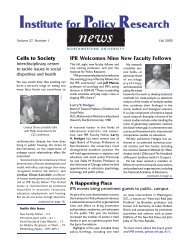pdf - Institute for Policy Research - Northwestern University
pdf - Institute for Policy Research - Northwestern University
pdf - Institute for Policy Research - Northwestern University
Create successful ePaper yourself
Turn your PDF publications into a flip-book with our unique Google optimized e-Paper software.
diagnose depression and anxiety disorders.<br />
Initial analyses of the actigraphy data<br />
demonstrate that prior day sleep has<br />
a strong impact on next-day positive<br />
and negative mood, net of the effect of<br />
prior-day mood, which implies that sleep<br />
timing and quality helps to determine<br />
daily emotional experience. At age 16,<br />
higher stress levels and cortisol predicted<br />
depression 18 months later. This suggests<br />
that measurements of psychosocial<br />
and biological stress in high school are<br />
important predictors of later depression as<br />
adolescents transition to adulthood.<br />
Adam and her colleagues are also examining<br />
how sleep can affect metabolism and<br />
thus children’s development and health.<br />
Adam, IPR graduate research assistant<br />
Emily Snell, and economist Greg Duncan<br />
studied data on 1,400 kids ages 3 to 12<br />
from two waves of the Panel Study of<br />
Income Dynamics (PSID). They found<br />
that fewer hours of sleep predicted an<br />
increase in body mass index (BMI) five<br />
years later. This is the first study to show<br />
convincing links between sleep and BMI<br />
in children and adolescents, a population<br />
<strong>for</strong> whom concern regarding obesity is<br />
high, due to its associations with serious<br />
future health problems such as diabetes<br />
and cardiovascular disease. The findings<br />
also show that many children are not<br />
getting their recommended hours of sleep.<br />
A second study using the PSID data,<br />
conducted with human development<br />
and social policy graduate students Snell<br />
and Patricia Pendry, addresses the social<br />
determinants of total sleep hours and<br />
timing. How do demographic variables,<br />
structural constraints such as school<br />
start times, children’s activity choices,<br />
and aspects of their family functioning<br />
relate to the sleep behaviors of America’s<br />
children? Among the many findings of<br />
this study: African American children<br />
and adolescents sleep approximately 30<br />
minutes less than white children on both<br />
weekends and weekdays, placing them<br />
at a cognitive and health disadvantage.<br />
Some of this sleep deprivation relates to<br />
black children having to wake up earlier<br />
because of longer school commute times.<br />
Adam was also lead author of a study in<br />
the Proceedings of the National Academy of<br />
Sciences showing that when older adults<br />
go to bed lonely, sad, or overwhelmed,<br />
they have elevated levels of the stress<br />
hormone cortisol shortly after waking<br />
the next morning. This rise could help<br />
give them a needed boost of energy to<br />
meet the demands of their day, providing<br />
evidence that cortisol influences—and is<br />
influenced by—the daily experiences of<br />
older adults. The study takes a rare look<br />
at the physiological, social, and emotional<br />
dynamics of day-to-day experiences in<br />
real-life settings. The results were reported<br />
by Scientific American and ABCNews.com,<br />
among others.<br />
Developmental Health Disparities<br />
from Conception Through Adulthood<br />
In the area of developmental<br />
health disparities from conception<br />
through adulthood, research<br />
focuses in particular on prenatal<br />
and perinatal environments and<br />
how they interact with social,<br />
genetic, and other biological<br />
influences. Social and biological<br />
risks to health across the life span<br />
are also addressed.<br />
Working with U.S. and Filipino<br />
collaborators, anthropologist<br />
Christopher Kuzawa studies the<br />
influence of fetal and infant<br />
nutrition and growth on adult health<br />
and function in the Philippines. The<br />
Cebu Longitudinal Health and Nutrition<br />
Survey has followed more than 3,000<br />
mothers who were pregnant in 1983,<br />
and their children, who are now young<br />
adults and having children of their own.<br />
He and his colleagues have recently<br />
Adam and her<br />
colleagues are also<br />
examining how sleep<br />
can affect metabolism<br />
and thus children’s<br />
development and<br />
health.<br />
B. Kelley<br />
www.northwestern.edu/ipr 39
















